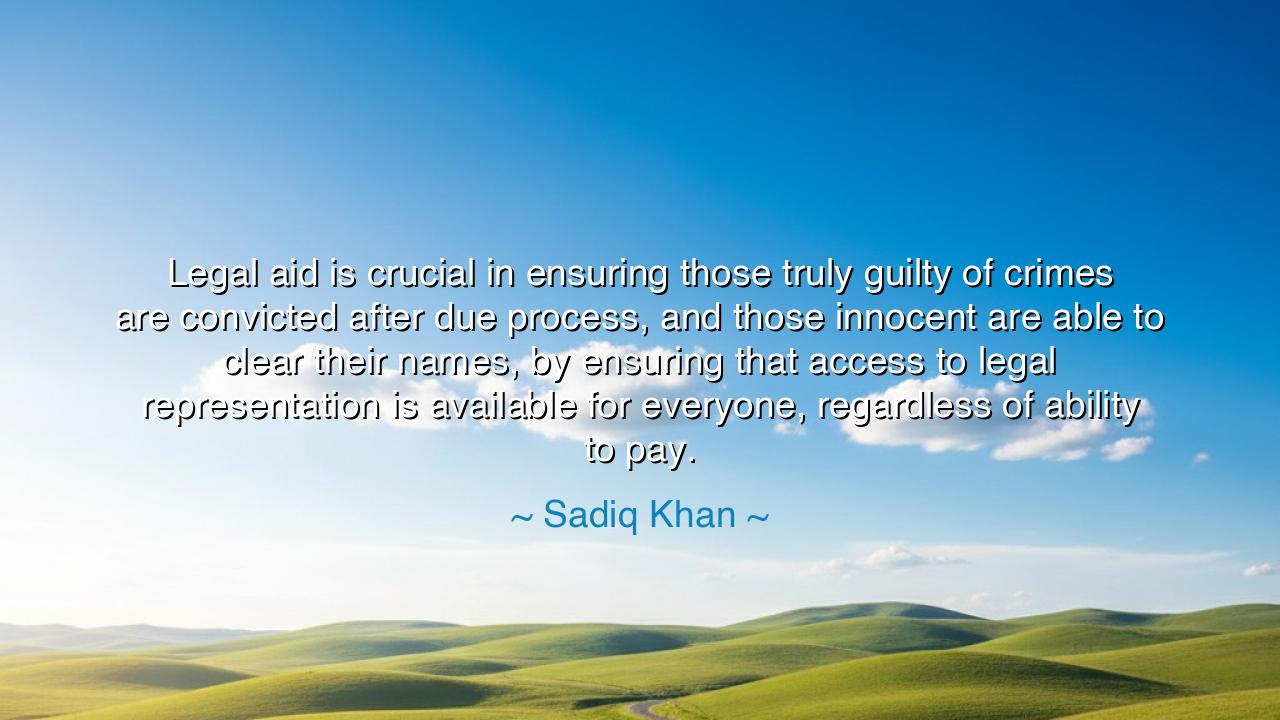
Legal aid is crucial in ensuring those truly guilty of crimes are
Legal aid is crucial in ensuring those truly guilty of crimes are convicted after due process, and those innocent are able to clear their names, by ensuring that access to legal representation is available for everyone, regardless of ability to pay.






The words of Sadiq Khan speak with both moral clarity and civic wisdom: “Legal aid is crucial in ensuring those truly guilty of crimes are convicted after due process, and those innocent are able to clear their names, by ensuring that access to legal representation is available for everyone, regardless of ability to pay.” In these words lies a truth that transcends law and touches the essence of justice itself — that a society cannot call itself fair if the scales of justice tilt according to wealth. The law, like the sun, must shine upon all equally, or it ceases to be law and becomes merely another instrument of power.
From the dawn of civilization, the guardians of justice have wrestled with this balance. In the courts of Athens, it was said that all men were equal before the law — yet in practice, only those with money and influence could afford eloquent advocates to defend them. Sadiq Khan, himself a man who rose from humble beginnings to become both lawyer and leader, understands the deep injustice of such disparity. His words call back to the original dream of democracy — that every person, rich or poor, stands before the law as an equal being, judged by truth, not by fortune.
Legal aid, then, is not a luxury or an act of charity — it is the lifeblood of a moral civilization. Without it, the innocent may languish in darkness, condemned by ignorance or silence, while the guilty escape through the cracks that money alone can open. The law’s promise of due process — that sacred assurance that every person shall have a fair hearing — is meaningless if one side speaks with the polished tongue of wealth while the other can only whisper through fear. Justice cannot be blind when poverty blinds its victims first.
History, in its long memory, offers examples that bear witness to this truth. In the United States, during the case of Gideon v. Wainwright in 1963, a poor man named Clarence Earl Gideon stood accused of a petty crime. Unable to afford a lawyer, he asked the court for one — and was denied. Convicted and imprisoned, he did not surrender. From his cell, he wrote a simple plea to the Supreme Court, arguing that every citizen deserves legal counsel, whether they can pay or not. The Court agreed, and from that case was born a cornerstone of modern justice: the right to counsel for all defendants. One man’s faith in fairness changed the destiny of millions.
It is this very spirit that Khan invokes — the understanding that justice is not served by conviction alone, but by truth revealed through fairness. When the guilty are punished after proper process, society upholds order. But when the innocent are freed through competent defense, society upholds its soul. Legal aid bridges the chasm between these two sacred duties, ensuring that neither vengeance nor neglect corrupts the law’s purpose.
Yet even in our modern age, the struggle continues. Too often, legal aid systems are weakened, underfunded, or dismissed as unnecessary burdens. Too often, the poor stand defenseless against the machinery of accusation. But when a government starves its defenders, it weakens its own moral foundation. For every society that forgets its duty to the vulnerable begins to crumble from within — not from enemies at its gates, but from the quiet erosion of justice in its courts.
The lesson, therefore, is clear and enduring: justice must never depend on wealth. To deny legal aid to the poor is to deny humanity itself. A righteous society must not only judge fairly but must give every soul the means to be heard. Let those who serve the law remember that their highest calling is not profit but truth, not victory but fairness. And let every citizen defend the principle that access to justice is the foundation of freedom — for when even the smallest voice can be heard in court, the spirit of equality lives, and the light of civilization endures.
Thus, let the words of Sadiq Khan be etched upon the hearts of those who govern and those who serve: that the law’s greatness lies not in its power to punish, but in its power to protect — to guard the innocent, restrain the guilty, and remind every generation that justice belongs to all, or it belongs to none.






AAdministratorAdministrator
Welcome, honored guests. Please leave a comment, we will respond soon